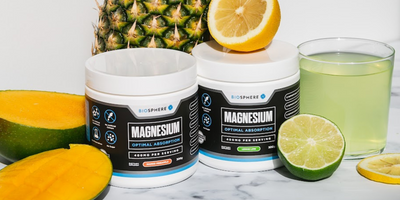
The Importance of Magnesium for Exercise
Magnesium - The Underappreciated Mineral for Peak Performance
Magnesium is an essential mineral that plays a crucial role in maintaining optimal health and well-being. However, it's often overlooked when it comes to exercise performance. Adequate magnesium intake is vital for athletes and fitness enthusiasts alike, as it contributes to a wide range of bodily functions. In this article, we'll explore the importance of magnesium for exercise, its benefits, and how to ensure you're getting enough of this essential mineral.
Understanding Magnesium's Role in the Body
Why Magnesium is Essential for Exercise Performance
Magnesium is involved in over 300 biochemical reactions in the human body, many of which are directly related to exercise performance. Here are some of the main reasons why magnesium is essential for exercise:
-
Energy Production: Magnesium plays a vital role in the production of ATP (adenosine triphosphate), the primary source of energy for cells. During exercise, your body needs to produce large amounts of ATP to fuel your muscles, and magnesium helps facilitate this process.
-
Muscle Function: Magnesium contributes to proper muscle function by regulating the contraction and relaxation of muscles. It helps maintain the balance of electrolytes in muscle cells, preventing cramps and spasms that can impair performance.
-
Protein Synthesis: Magnesium is necessary for the synthesis of proteins, which are the building blocks of muscles. Adequate magnesium intake can support muscle growth and repair, which is essential for improving exercise performance and recovery.
-
Bone Health: Magnesium is crucial for maintaining strong bones, as it supports the absorption of calcium and the activation of vitamin D. Strong bones are less prone to fractures and injuries, which is particularly important for athletes and those engaging in high-impact exercises.
Signs of Magnesium Deficiency in Athletes
Many athletes and fitness enthusiasts unknowingly suffer from magnesium deficiency, which can negatively impact their exercise performance and overall health. Some common signs of magnesium deficiency include:
- Muscle cramps and spasms
- Fatigue and weakness
- Difficulty sleeping
- Increased heart rate
- Poor recovery after exercise
If you're experiencing any of these symptoms, it's crucial to consult with a healthcare professional and consider increasing your magnesium intake.
Magnesium and Exercise Benefits
Improved Exercise Performance
Magnesium supplementation has been shown to enhance exercise performance by increasing energy production, improving oxygen delivery to muscles, and reducing lactic acid build-up. These benefits can lead to improved endurance, strength, and overall physical performance.
Faster Recovery
Magnesium is essential for muscle recovery and repair, as it aids in protein synthesis and helps reduce inflammation. Adequate magnesium intake can lead to faster recovery times and reduced muscle soreness after exercise.
Risk of Injury
Maintaining proper magnesium levels can help prevent injuries by promoting healthy muscle function and strong bones. Additionally, magnesium's role in reducing inflammation can also contribute to a lower risk of injury.
Better Sleep Quality
Magnesium has been shown to improve sleep quality by regulating neurotransmitters and hormones responsible for sleep. Better sleep is essential for optimal exercise performance and recovery, making magnesium an important nutrient for athletes and fitness enthusiasts.
How to Increase Magnesium Intake for Optimal Exercise Performance
Dietary Sources of Magnesium
The best way to ensure adequate magnesium intake is through a well-balanced diet that includes magnesium-rich foods. Some excellent sources of magnesium include:
- Leafy green vegetables (spinach, kale, Swiss chard)
- Nuts and seeds (almonds, cashews, pumpkin seeds)
- Whole grains (brown rice, quinoa, whole wheat bread)
- Legumes (black beans, lentils, chickpeas)
- Fish (salmon, mackerel, halibut)
- Avocado
- Dark chocolate
Aim to incorporate a variety of these foods into your daily meals to ensure you're getting enough magnesium to support your exercise performance.
Magnesium Supplements
If you're struggling to get enough magnesium from your diet, or if you have increased needs due to intense physical activity, magnesium supplements can be a helpful addition. There are various forms of magnesium supplements available, including magnesium citrate, magnesium glycinate, and magnesium oxide. Speak with your healthcare professional to determine the best form and dosage for your specific needs.
However, it's important to remember that supplements should not replace a balanced diet but rather complement it.
Topical Magnesium
Topical magnesium, such as magnesium oil or magnesium-infused creams, can be an effective way to increase magnesium levels, particularly for those who struggle with oral supplementation. Applying magnesium topically allows for direct absorption through the skin, bypassing the digestive system. This can be particularly useful for targeting muscle soreness or cramps.
Recommended Magnesium Intake for Athletes
The recommended daily allowance (RDA) for magnesium varies based on age, sex, and life stage. Generally, adult men require 400-420 mg of magnesium per day, while adult women need 310-320 mg. However, athletes and individuals with high physical activity levels may require more magnesium to support their increased needs.
For a more individual amount, check out our magnesium dose calculator.
Conclusion: Don't Overlook the Importance of Magnesium for Exercise
Magnesium is a crucial nutrient for optimal exercise performance and overall health. Ensuring adequate magnesium intake through a balanced diet, and supplementation if necessary, can help improve your exercise performance, reduce the risk of injury, promote better sleep, and support faster recovery. By understanding the importance of magnesium for exercise and taking steps to maintain proper magnesium levels, you can unlock your full potential and reach your fitness goals.
Summary
1. Energy production: Magnesium is involved in the production of adenosine triphosphate (ATP), the primary energy source for cells. During exercise, the body requires more ATP to fuel muscle contractions, making magnesium essential for maintaining energy levels.
2. Muscle function: Magnesium helps regulate muscle contractions and relaxation by affecting calcium levels within muscle cells. Proper magnesium levels can prevent muscle cramps, weakness, and spasms during exercise.
3. Electrolyte balance: As an essential electrolyte, magnesium helps maintain the proper balance of electrolytes in the body, which is crucial for hydration, muscle function, and preventing cramps during exercise.
4. Oxygen utilization: Magnesium aids in the transportation of oxygen to working muscles, improving exercise efficiency and endurance. This enables athletes to perform at a higher intensity for longer periods.
5. Protein synthesis: Magnesium plays a critical role in protein synthesis, which is essential for muscle growth and repair after exercise. Adequate magnesium levels support optimal recovery and can reduce the risk of injury.
6. Lactic acid clearance: Magnesium helps to clear lactic acid from the muscles, reducing muscle fatigue and soreness. This allows athletes to recover more quickly after intense workouts.
7. Stress response: Exercise induces physical stress, triggering the release of stress hormones. Magnesium helps regulate the body's stress response and can potentially reduce the negative effects of exercise-induced stress.
8. Bone health: Magnesium is vital for maintaining strong bones, as it aids in calcium absorption and bone mineralization. This is particularly important for athletes, as it helps prevent stress fractures and other exercise-related injuries.
9. Nervous system function: Magnesium is essential for the proper functioning of the nervous system, which controls muscle coordination and movement. Adequate magnesium levels can improve athletic performance by enhancing neuromuscular communication.
10. Heart health: Magnesium is involved in maintaining a regular heartbeat and healthy blood pressure. During exercise, the heart works harder, making it crucial to maintain adequate magnesium levels for cardiovascular health and performance.
Magnesium Information
For everything you need to know about magnesium and magnesium supplements, check out our comprehensive information page here.
Magnesium
We’ve created a magnesium supplement with a combination of three types of highly absorbable magnesium at a therapeutic dose. Our magnesium comes as an easy to mix, great tasting powder to ensure optimal absorption. To learn more about our magnesium, check out the product page here.








